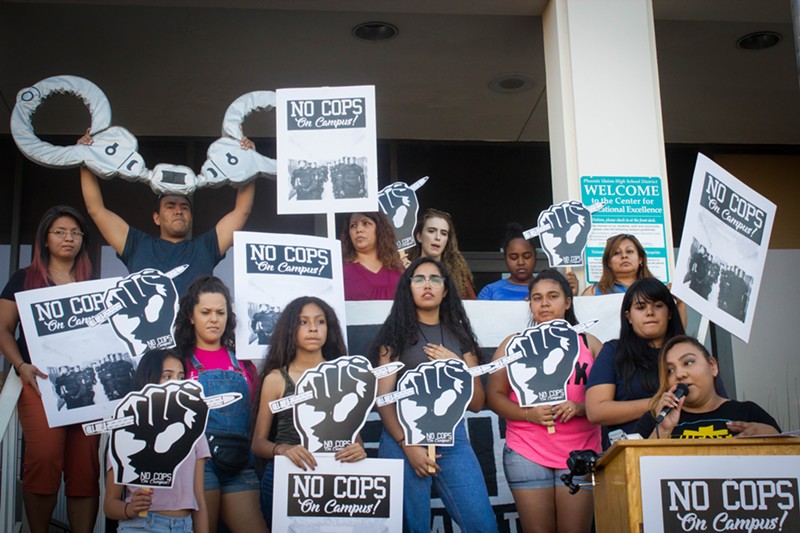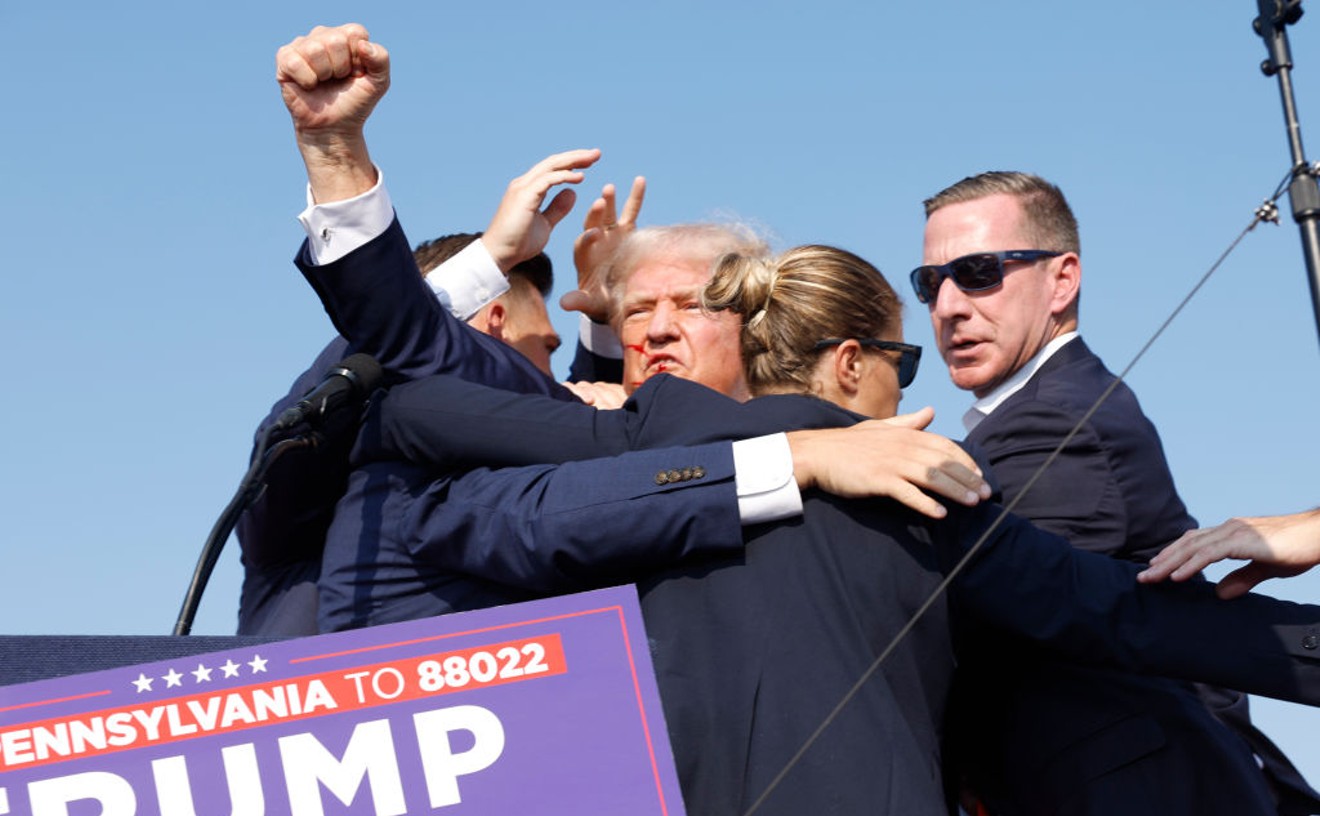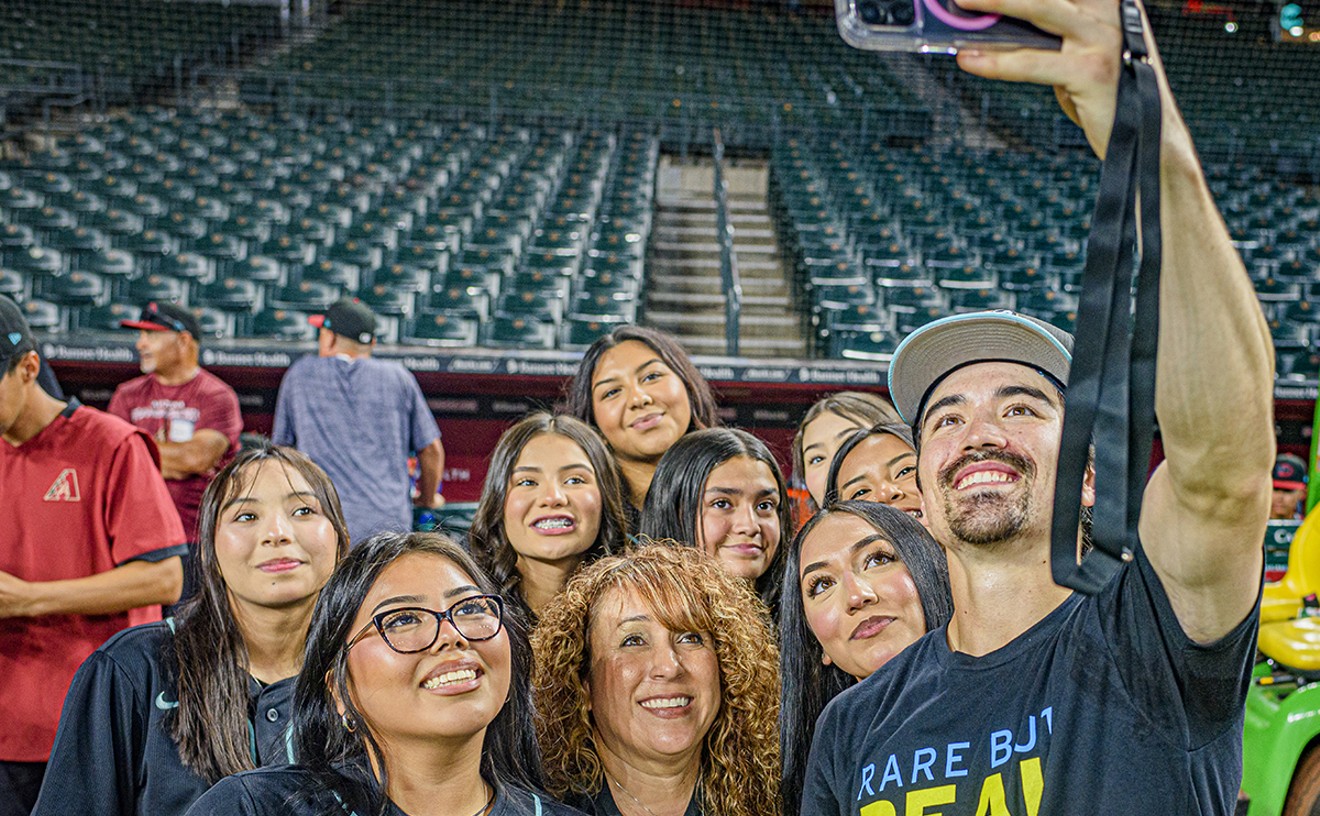But local activists are focusing on a bigger target:.
They're trying to get the resource officers, sworn law-enforcement officers assigned to public schools, removed from campuses entirely.
Back in March, Phoenix police chief Jeri Williams said she'd look into making it explicitly clear that officers assigned to public schools aren't there to act as the immigration police.
"We’re not on campus asking about immigration status," she told the City Council's ad hoc subcommittee on Trump's executive orders. "It’s not clear in our policy. But that’s not what we’re doing there."
Coming up with a formal policy that wouldn't violate SB 1070 would be a delicate balance, she said.
Still, she assured the group, “Working with the school district and with our attorneys, it’s absolutely logical that we could come up with some different language for the policy that can help minimize some of that fear.”
In theory, the Phoenix Police Department shouldn't have had to look too far to find that language: Tucson, Mesa, and Flagstaff already have specific guidelines in their general orders that say that school resource officers shouldn't be asking about immigration status.
But several months have passed, and it's now June. What's happening?
"Our policy is still under review," Sergeant Jonathan Howard tells Phoenix New Times.
Asked for a timeline, Howard says that he expects the policy to be officially updated by late June.
"[Chief Williams] is meeting with city leaders and community groups before finalizing the draft," he explains. "It then needs to be distributed throughout our department for review before it can be finalized."
Yet, weirdly, the community groups chosen to give feedback on the policy don't seem to include any of the organizations in the Phoenix area that advocate for the rights of undocumented immigrants.
The chief will meet with the ACLU and "several of their local affiliates," Howard says. He adds, "The chief was available for input at the open ad hoc meetings regarding immigration."
Puente Arizona, arguably the most vocal of the local immigrant-rights groups, confirms that that they haven't been invited to share their thoughts on the proposed policy.
"It's not like they don't know we're trying to address that issue," Leidy Robledo, a youth organizer with Puente, says. "We have no idea what the policy is — we haven't seen it."
But Robledo says that simply telling school resource officers that they can't ask students about their immigration status isn't going to fix what Puente describes as a "school-to-deportation pipeline."
"It would be a great first step, but it's not enough," she says.
She points out that students who are arrested on campus wind up in the county jail, which means a call to ICE to check their immigration status. If they're found to be present in the country illegally, they're likely to be scheduled for deportation.
At that point, Robledo says, "We know it's almost impossible to fight that deportation."
Under Trump's new immigration policies, anyone with a criminal record is considered a priority for removal. No distinction is made between, say, a serial murderer, and a teenager who's been caught with a small amount of pot.
"We have data from Phoenix Union that shows that a lot of these arrests are not even for assault, for the dangerous stuff," Robledo says. "Usually that's the narrative — what if someone brings a gun? But that's not the reality."
In May, Robledo helped a group of students from the Phoenix Union High School District to launch the #CopsOuttaCampus campaign.
The goal is to get police officers removed from all 17 Phoenix Union campuses, and have that money directed towards education and support services instead.
As one of the teenagers pointed out during the campaign launch, Phoenix Union has a large number of low-income students. Many don't have access to computers at home, which makes it tough to do homework assignments that require online research. Investing in better, faster computers would make it easier for them to succeed in school. So would getting up-to-date textbooks.
"Our schools need to create better school systems where we are being prepared for success instead of being prepared for prison," Michelle Ruiz, a student at Central High, says. "Safety means having better counselors, having better support to advance in my education."
Ruiz's comment about feeling like she's being "prepared for prison" shows how the presence of police officers on campus can make students feel like their school views them as potential criminals. And they're not entirely wrong.
Numerous studies have shown that students are more likely to get arrested and wind up in court or jail if they attend a school that has law enforcement officers on campus, which in turn increases the likelihood that they'll drop out altogether. Often, they're getting arrested for relatively minor offenses like throwing spitballs or swearing at a teacher, which would ordinarily merit a suspension or detention.
And federal data shows that high-poverty schools with a majority of non-white students are more likely to have law enforcement officers on campus than affluent, white schools, which means that the problem disproportionately affects black and Latino students.
So getting rid of school resource officers isn't just about protecting undocumented students — it's much bigger.
"At the end of the day, we're not just trying to get the SROs to not ask for papers," Robledo says. "We're asking for students to not fall into the system."











